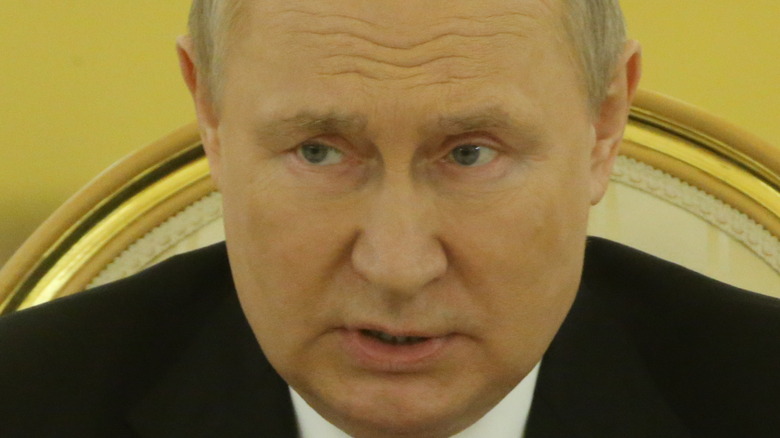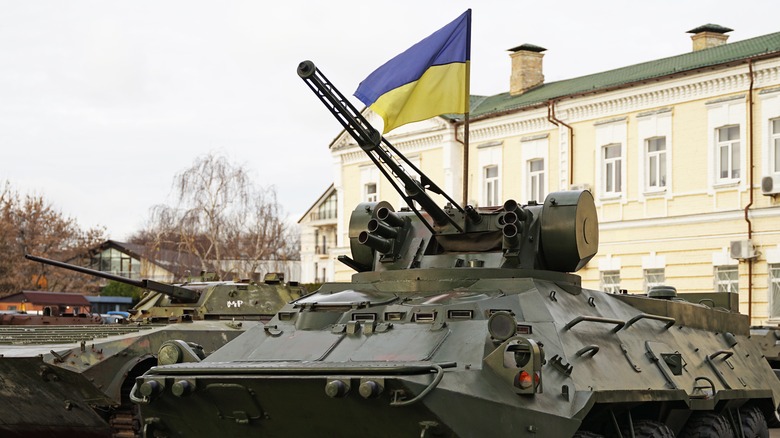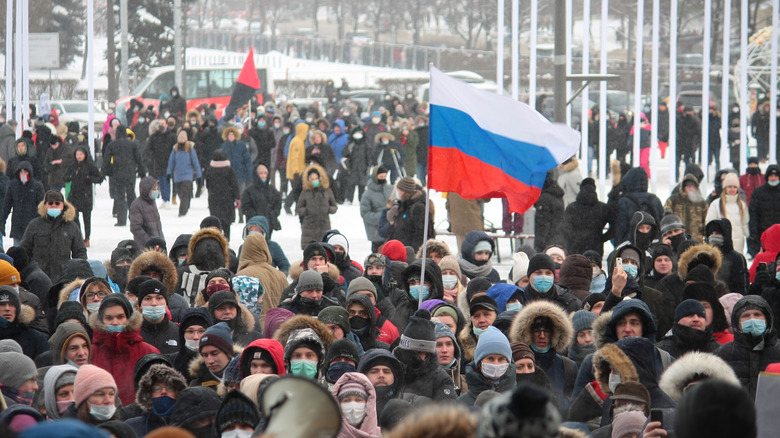Criticizing The Russian Government Could Land You In Serious Trouble
Though the Russian Federation has the principle of "free speech" enshrined in its constitution, the northern nation is not exactly known for its commitment to the practice.
After all, Russia's precursor, the Soviet Union, was known for jailing political dissidents and was one of the major inspirations for George Orwell's "1984," which warned of newspeak, ministries of truth, and like, as the BBC notes. The USSR was also known for its major newspaper, "Pravda," which functioned as a propaganda arm of the Communist party, per Britannica.
Though today's Russia is not the same nation as the Soviet Union, its recent moves to curb government criticism are eerily similar to those in the past. Part of the issue is that the rise of the internet has given people a new way to read and dispense information. This has not gone unnoticed by the Russian government, and it has been active over the past few years to limit criticism of the Russian state.
According to the BBC, the Russian Parliament passed two laws in 2019 that curbed how citizens could voice their unhappiness with the government. One outlawed "disrespect" towards three different bodies: the Kremlin, its officials, and Russian society at large. The second bill outlawed "false information of public interest, shared under the guise of fake news," as defined by the Russian government.
Breaking this law resulted in fines, ranging from $1,500 to $15,000, depending on the frequency of violations. Repeat offenders were also threatened with imprisonment for around 15 days.
Free speech laws got even harsher after the Ukrainian invasion
However, Russian lawmakers ushered in a new set of even harsher laws targeting those who criticize the government following the February invasion of Ukraine. According to USA Today, a recent law passed in March 2022 has officially banned any misinformation on what the Kremlin has called its "special military operation." Even using words like "war" and "invasion" can get civilians in trouble.
While the previous 2019 laws mainly punished violators with fines, the 2022 law took a much more drastic approach, with those found guilty of spreading "fake news" facing up to 15 years in prison. Even more frightening is that the law is retroactive, meaning a journalist or civilian who tweeted or posted on a forum years earlier could face repercussions.
The Russian government hailed the strict new measures as a win for national security. Vyacheslav Volodin, who serves as the speaker of the lower house of parliament, said the law "will force those who lied and made statements discrediting our armed forces to bear very grave punishment."
Meanwhile, Western-based media outlets decided to depart from the Russian Federation rather than risk their journalists' safety. The BBC suspended coverage and CNN stopped doing live broadcasts in Russia. It is not just Western media that has taken note; TikTok, a popular Chinese-owned social media app, similarly suspended live-streaming, noting it needed to "review the safety implications of this law," per Twitter.
Some Russians have fled because of the anti-Free Speech laws
Though much of the media's focus has understandably been on the refugees fleeing Ukraine, there has also been a large number of Russians that are fleeing their homeland because they are worried about both the retroactive nature of the new law — as well as what it means for the future. "It's going to be really bad for Russia, not just in an economic sense, but like, in a cultural sense," noted Yakov, the son of two Russian dissidents in the 1980s (via CBS News).
Over the past five months, more than 7,000 Russians have entered the U.S. through the southern border — despite sanctions and closed embassies that make it near impossible for Russian citizens to leave the country. Though the United States does not officially offer asylum to Russia, a Department of Homeland Security spokesperson said that the country does offer refuge on a case-by-case basis for "particularly vulnerable individuals," per Reuters.
But other Russians are fighting back
Despite the daunting repercussions attached to the new law, some in Russia are fighting back. Popular Russian rock musician recently mocked Putin by calling him "Caesar" to a large crowd of around 10,000 fans. Shevchuk also spoke of his opposition to corruption and the war in Ukraine, which earned him applause from his fans (via The Mirror).
After the concert, Shevchuk was reportedly detained by authorities but ultimately released. It has been rumored that he will soon be facing charges for "for discrediting the Russian armed forces," but nothing has been leveled at present.
There have also been less overt forms of protest by the Russian people. For example, many citizens use TOR or a VPN network to access the internet to read banned information or post thoughts that be flagged by the strident new laws, according to the BBC. In fact, as many as 15% of all TOR users are located in the Russian Federation, despite the fact that the government has blocked the platform (via The Tor Project).



